

Some needs that are highlighted by WHO includes financial security, ability to be mobile, building social relationships, ability to contribute to the society and leaving their legacy to their next generation. However, the inability to fulfil these needs may cause the elderly to feel challenged.
When human feel challenged or threatened, our body will be flooded with hormones that prepare its system to fight or flight away from these dangers (Sampson, 2020). The flight or fight responses may then be displayed through physical or emotional symptoms. Thus, stress occurs when needs are not met. This resource will illustrate the type of needs that causes stress in the elderly and ways that can be adopted to manage stress.
Some resources are in Chinese language for elderly who are more familiar with Chinese.
The Basics of Stress. Stress is a situation that triggers a particular biological response.
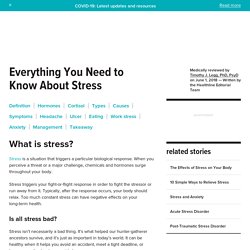
When you perceive a threat or a major challenge, chemicals and hormones surge throughout your body. Stress triggers your fight-or-flight response in order to fight the stressor or run away from it. Typically, after the response occurs, your body should relax. Too much constant stress can have negative effects on your long-term health. Is all stress bad? Stress isn’t necessarily a bad thing. We all feel stressed at times, but what one person finds stressful may be very different from what another finds stressful. Stress isn’t always a bad thing, either. But stress should be temporary. On the other hand, severe, frequent, or prolonged stress can be mentally and physically harmful. And it’s fairly common. Life being what it is, it’s not possible to eliminate stress completely. Stress is a normal biological reaction to a potentially dangerous situation. One of these hormones is adrenaline. How does stress happens? What stress does to your body? Overview of Section 2.
Needs of the Elderly and Stress. Health, psychological and socio-emotional needs in ageing. With age comes wisdom, but it also comes with a bunch of problems.
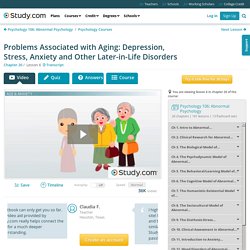
In this lesson, we'll look at some psychological problems that can plague older adults, including depression, anxiety, substance abuse, and psychosis. Geriatric Psychology Edna just celebrated her 90th birthday. Instead of being happy, though, she's feeling very blue. In the past 10 years, her husband has passed away, she's started to lose her hearing and her son moved her into a nursing home. Aging comes with a new set of issues. Like Edna, many older patients find themselves feeling depressed and anxious. Age and Depression Edna's feeling really down in the dumps. People over age 65 can experience depression that is triggered by life changes. Depression can be treated with drugs and therapy. Age and Anxiety Depression isn't the only mental health problem that is common with the elderly. As with depression, anxiety is often triggered in older adults because of life changes. Case Example of Facing Elderly Depression by CNA Insider (how health, socio-emotional and psychological needs are related)
Singapore's Elderly Poor by CNA Insider (How physiological needs affect quality of life) 7 Tips to Improve Cognition & Emotion in the Elderly's Mental health. Common mental health issues like anxiety and depression can have a negative impact on physical health and wellness for seniors.
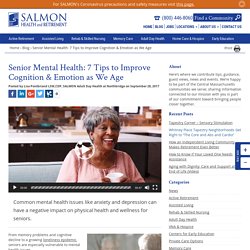
From memory problems and cognitive decline to a growing loneliness epidemic, seniors are especially vulnerable to mental health issues. In many cases, sadness and social isolation can have additional negative side effects and increase the risk of serious health problems. The good news about Senior Mental Health The good news about Senior Mental Health is that there are a number of activities and resources available to help keep the older adults close to you engaged and in good mental health and spirits. Stress Management in the Elderly. We all need to face different kinds of mental stress in various stages of life.
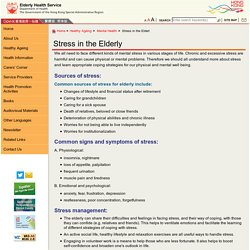
4 Ways to Alleviate Senior Loneliness and Depression. As humans, we strive to live healthily and pursue success and happiness.
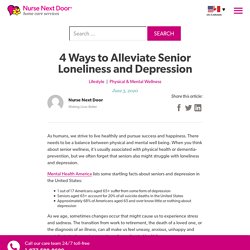
There needs to be a balance between physical and mental well being. When you think about senior wellness, it’s usually associated with physical health or dementia-prevention, but we often forget that seniors also might struggle with loneliness and depression. Mental Health America lists some startling facts about seniors and depression in the United States: 1 out of 17 Americans aged 65+ suffer from some form of depressionSeniors aged 65+ account for 20% of all suicide deaths in the United StatesApproximately 68% of Americans aged 65 and over know little or nothing about depression. Best and Worst Ways to Cope With Stress.
Worst: Eat your feelings Like alcohol or drugs, food often becomes a crutch when coping with difficult times.

Soothing your pain with high-calorie, high-sugar, or high-fat comfort foods feels good at first, but it can quickly spiral out of control when your mind and body begin to associate negative emotions with eating. At the first sign of stress, anger, or sadness you'll instinctively reach for food rather than dealing with the feelings at hand. Overeating can cause weight gain and make you feel worse about yourself, as well as exacerbate the GI issues (bloating, reflux, constipation) that often accompany stress, says Hall.
Worst: Eat your feelings Like alcohol or drugs, food often becomes a crutch when coping with difficult times. Case Example of Mr Ong: How he keep himself engaged and contributing to society despite losing his wife and children. Case Example of Helen: Community Support. Ways Elderly can manage stress in Chinese Language. Community Support for Elderly and how it helps them in Chinese Language.